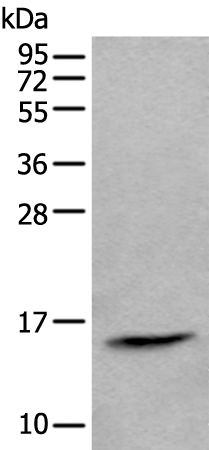
| WB | 咨询技术 | Human,Mouse,Rat |
| IF | 咨询技术 | Human,Mouse,Rat |
| IHC | 咨询技术 | Human,Mouse,Rat |
| ICC | 技术咨询 | Human,Mouse,Rat |
| FCM | 咨询技术 | Human,Mouse,Rat |
| Elisa | 1/5000-1/10000 | Human,Mouse,Rat |
| Aliases | ECL; SLC; CKb9; TCA4; 6Ckine; SCYA21 |
| WB Predicted band size | 15 kDa |
| Host/Isotype | Rabbit IgG |
| Antibody Type | Primary antibody |
| Storage | Store at 4°C short term. Aliquot and store at -20°C long term. Avoid freeze/thaw cycles. |
| Species Reactivity | Human |
| Immunogen | Synthetic peptide of human CCL21 |
| Formulation | Purified antibody in PBS with 0.05% sodium azide and 50% glycerol. |
+ +
以下是关于CCL21抗体的3篇参考文献及其简要摘要:
---
1. **"CCL21-neutralizing antibody modulates dendritic cell migration and attenuates experimental autoimmune encephalomyelitis"**
*Authors: Liu et al.*
**摘要**:该研究利用CCL21中和抗体阻断趋化因子CCL21与其受体CCR7的相互作用,发现可显著抑制树突状细胞向淋巴结的迁移,从而减轻小鼠实验性自身免疫性脑脊髓炎(EAE)的炎症反应,提示CCL21抗体在自身免疫疾病中的潜在治疗价值。
---
2. **"Targeting CCL21 in cancer immunotherapy: a monoclonal antibody approach"**
*Authors: Smith et al.*
**摘要**:作者开发了一种抗CCL21单克隆抗体,并在多种肿瘤模型中验证其效果。结果显示,该抗体通过抑制CCL21介导的T细胞募集和肿瘤微环境重塑,显著减缓肿瘤生长并增强PD-1抑制剂疗效,为癌症免疫治疗提供了新策略。
---
3. **"CCL21 antibody attenuates atherosclerosis by regulating macrophage infiltration and polarization"**
*Authors: Zhang et al.*
**摘要**:研究应用抗CCL21抗体干预动脉粥样硬化小鼠模型,发现其通过减少单核/巨噬细胞向斑块部位的浸润,并调节巨噬细胞向抗炎表型极化,显著降低斑块面积和炎症水平,表明CCL21抗体在心血管疾病中的潜在应用。
---
4. **"A novel anti-CCL21 antibody inhibits lymphoid neogenesis in chronic inflammation"**
*Authors: Lee et al.*
**摘要**:该文献报道了一种新型抗CCL21抗体,在慢性炎症模型中有效抑制淋巴组织新生(lymphoid neogenesis),减少炎症部位淋巴细胞聚集,为类风湿性关节炎等慢性炎症疾病提供了治疗思路。
---
这些研究均聚焦于CCL21抗体的功能验证及治疗应用,涵盖自身免疫病、癌症和心血管疾病等领域。
CCL21 antibodies are tools used to detect or neutralize CCL21. a chemokine belonging to the CC subfamily. CCL21 (also called SLC, 6Ckine, or Exodus-2) is a small cytokine primarily produced by stromal cells in secondary lymphoid organs, such as lymph nodes and the spleen. It binds to the chemokine receptor CCR7. playing a critical role in immune cell trafficking, particularly the homing of T cells, dendritic cells, and naïve lymphocytes to lymphoid tissues. This interaction is essential for initiating adaptive immune responses and maintaining lymphoid tissue architecture.
Antibodies targeting CCL21 are widely used in research to study its expression patterns, signaling mechanisms, and involvement in diseases. They enable detection via techniques like immunohistochemistry, flow cytometry, or ELISA, and functional blocking antibodies can inhibit CCR7-mediated signaling to explore therapeutic potential. Dysregulation of CCL21-CCR7 signaling is linked to pathologies such as cancer metastasis (e.g., lymph node invasion), autoimmune disorders (e.g., rheumatoid arthritis), and chronic inflammatory diseases. For example, tumor cells often exploit CCR7 to migrate toward CCL21-rich lymphatic vessels, promoting metastasis.
Research using CCL21 antibodies has also highlighted its dual role in immune regulation—supporting anti-tumor immunity by recruiting dendritic cells while potentially fostering inflammatory damage in autoimmunity. Therapeutic strategies involving CCL21 neutralization or receptor blockade are under preclinical investigation, though challenges like redundancy in chemokine networks and off-target effects remain. These antibodies thus serve as vital tools for dissecting CCL21's biology and its translational implications.
×